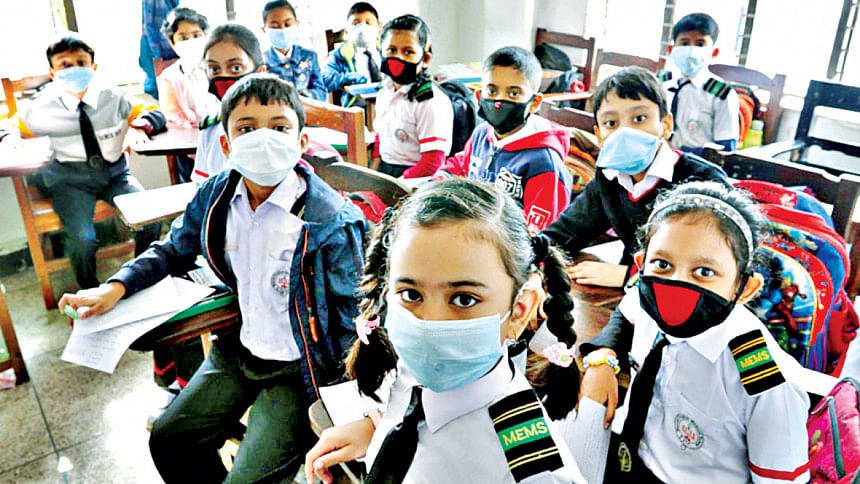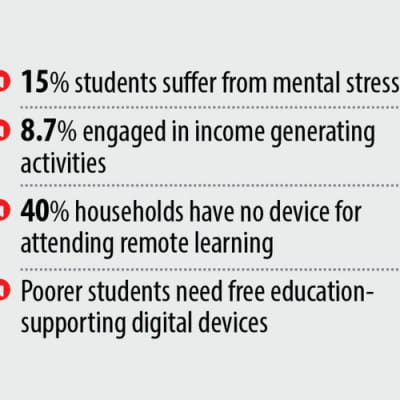Students Victim of School Closure: 7.86m at risk of learning loss


Around 7.86 million students were at risk of learning loss as schools remained closed for almost 18 months due to the pandemic, according to a new study.
A good number of students were also suffering from mental stress and facing risks of getting engaged in income-generating activities due to the closure, it says.
The study also says that the number of such students increased in August-September compared to March.
Power and Participation Research Centre (PPRC) and Brac Institute of Governance and Development (BIGD) shared the study findings with journalists at a virtual press conference yesterday.
The government had closed schools and other educational institutions across the country on March 17 last year as part of its efforts to contain the spread of Covid-19. In-person classes resumed at the institutions on September 12 after the situation improved.
Based on a previous study in March, PPRC and BIGD had said 5.92 million primary and secondary students in the country were at risk of learning loss as a result of the closure.
The term learning loss refers to any specific or general loss of knowledge and skills or to reversals in academic progress, most commonly due to extended gaps or discontinuities in a student's education, according to education and development forum UKFIET.
The learning crisis has worsened in the last six months, says the new study done in August and September.
About 22 percent primary school and 30 percent secondary school students surveyed were at risk of learning loss. It means 3.96 million primary and 3.9 million secondary students -- a total of 7.86 million students -- are at the risk, PPRC Executive Chairman Hossain Zillur Rahman said while disclosing the study findings yesterday.
"As a result, the dropout rate might go higher … The decision to reopen the schools was accurate and timely, but only reopening will not be enough to recover from learning loss," he said. "Supplementary remedial programmes are essential for both primary and secondary level students."
Yesterday, PPRC and BIGD shared findings from the first part of their fourth round of survey, which focused on the extended impact of Covid-19 on children's education in the country.
The survey was based on telephone interviews of heads of 4,872 rural and urban slum households with school-going children. Fifty-four percent of the respondents were from urban slums, 45pc from rural slums and one percent from Chattogram Hill Tracts. The interviews were taken between August 21 and September 8.
Carried out in March, the previous survey, titled "PPRC-BIGD Rapid Response Research: COVID Impact on Educational Life of Children", was based on telephone interviews of heads of 6,099 rural and urban slum households having school-going children. The study showed that 17 percent primary and 25 percent secondary students were at risk of learning loss in March.
Researchers said the latest study found that students at risk of learning loss were those not studying at all or studying without any supervision or studying irregularly via online classes or studying with help of family members or private tutors.
The risk of learning loss was more prominent among male students of secondary schools compared to their female counterparts.
Twenty-six percent of secondary male students were at risk in March. It increased to 34 percent in August.
The survey has found a direct relationship between a child's learning loss risk and the mother's education level. For example, children whose mothers never went to school face the highest risk.
Besides, the study shows that 40 percent of the households surveyed have no device for remote learning, including online classes. About 60 percent households have only one such devices.
The pandemic and the subsequent school closure also affected the mental health of children and adolescents, it also says.
In August, over 15 percent of the households reported that their school- or college-going children had been suffering from mental stress since the beginning of the pandemic. It was 13 percent in March.
Prof Syed Md Golam Faruk, director general of the Directorate of Secondary and Higher Education (DSHE), said the government was aware of the issue and that they were providing training to 2 lakh teachers on "Psychological First Aid" to address the issue.
The study also said the number of school-going boys engaged in income-generating activities was on the rise.
It said about 8.7 percent of the school-going boys were engaged in such activities which was 8 percent in March.
BIGD Executive Director Imran Matin stressed the importance of finding innovative and scalable solutions to address the twin risks -- learning loss and mental stress -- to tackle the "educational emergency".
"The cost of not treating this as an emergency can be extremely high in the long term, off-tracking years of progress and ambition," he said.
The study recommends well designed supplementary remedial programmes to recover learning loss, but said the programmes must continue outside school hours.
It called for ensuring psychosocial support for students. Expanding the secondary stipend programmes and enhancing the free distribution of digital devices among poorer students were also crucial, it said.

 For all latest news, follow The Daily Star's Google News channel.
For all latest news, follow The Daily Star's Google News channel. 



Comments